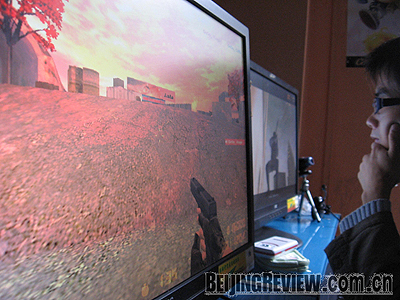|
|

CAPTIVATED: A young man plays Internet games in a Beijing net cafe. Games top the list of Internet addiction causes | Day after day you are glued to your computer screen. You cannot get enough of online games, net shopping or cyber surfing. Your social life deteriorates, and so does your health. Chances are that you are addicted to the Internet and you need counseling.
On November 8, an Internet Addiction Disorder (IAD) diagnostic manual was approved by a group of psychologists in China, who agreed that Internet addiction is a mental disease. The good news is that it can be cured through medical treatment.
According to a report on xinhuanet.com, the manual for the first time gives a clear time standard for diagnosing IAD, saying that lingering on the Internet for more than six hours a day, not for the purpose of studying or working, and having done so for no less than three months, might be a symptom of IAD.
Tao Ran, Director of the Addiction Studies Center at the Military General Hospital of Beijing PLA who headed the drafting of the manual, said in an interview with xinhuanet.com that the manual has been submitted to the Chinese Ministry of Health, and if it is ratified China would be the first country in the world to have a clinical diagnosing standard on IAD.
Addiction symptoms vary
Besides the prolonged online time, Tao said that some other symptoms would also help doctors diagnose IAD patients, such as having a strong desire for the Internet and feeling physical discomfort, becoming easily enraged, being unable to concentrate on things or finding it difficult to sleep if unable to get online.
Apart from these conditions, other symptoms are also listed in the manual. If a net surfer cannot get out of the virtual world of Web games, which has already affected his/her capability to study or work, or he/she feels little interest in doing anything but jumping online or is afraid to communicate with others, he/she is also considered to be an IAD sufferer.
"The IAD could lead to autism, self-contempt, confrontation with family members and other mental or psychological problems," Tao said.
He said that according to the World Health Organization, mental disease sufferers have two major characteristics: they bring affliction to both themselves and their families, and their abilities to be involved in social activities are affected. "Internet addicts conform to these two points," he said.
Tao explained that the manual was compiled based on their research of 3,000 cases of juvenile Internet addicts in China in the past four years. "We collected the common symptoms of more than 50 percent of the patients and then researched the frequency of these symptoms," Tao said.
According to Tao, Internet addiction is not only a psychological problem, but also a mental disorder caused by endocrine disorder. He said that IAD needs special medical treatment and requires great effort and strong willpower of sufferers to overcome.
"Internet addiction is curable and the treatment period would be around three months," Tao said. He is very confident that after medical treatment 80 percent of IAD sufferers can recover successfully.
He hopes that the manual will be helpful to doctors in diagnosing IAD and will also let all Internet addicts know whether they need to seek medical help. But he also pointed out that the manual still needs years of practical tests to be perfected.
Mental illness stigma
However, what began as a way of unifying the diagnosing standard on IAD in China has resulted in a backlash from the public, due to the fact that mental disease is a very sensitive term to Chinese.
| 